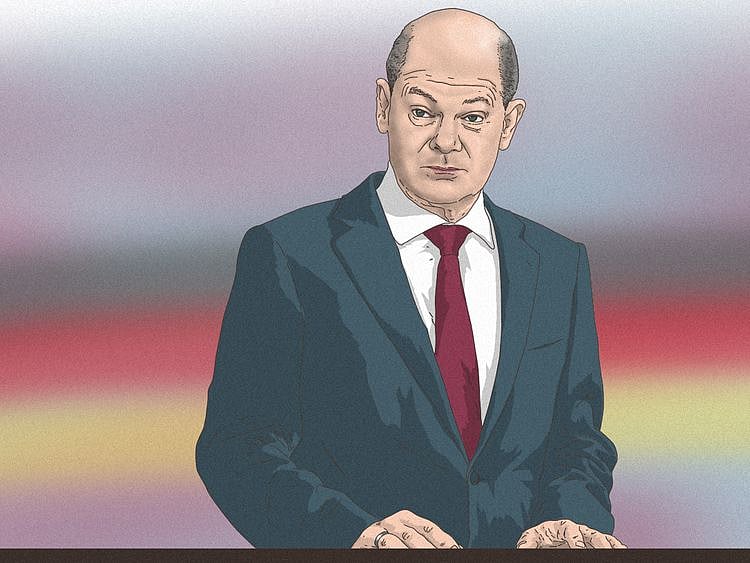Germany, Europe’s largest economy and political cornerstone, is on the cusp of a transformative election that could reshape its domestic and European future. With Chancellor Olaf Scholz’s government collapsing after losing a vote of confidence, Germany faces snap elections on February 23.
Friedrich Merz, the corporate lawyer-turned-politician leading the conservative Christian Democratic Union (CDU), is poised to become the next Chancellor. His potential reliance on the far-right Alternative for Germany (AfD), which was founded in 2013, raises significant concerns about the future of Germany’s democracy and its impact on the European Union.
The CDU/CSU bloc under Merz has surged ahead in the polls, holding a commanding lead with 32% support. The AfD, led by Alice Weidel, stands at 18% and could become Germany’s second-largest party. The Social Democrats (SPD) trail at 16%, followed by the Greens at 14%. Scholz, burdened by economic stagnation and coalition infighting, appears destined for political oblivion.
Merz, a multimillionaire corporate lawyer with a history at investment giant BlackRock, has steered the CDU further to the right, emphasising stricter immigration policies and pro-business reforms. His proposed tax cuts and welfare reductions resonate with a populace disillusioned by years of economic stagnation and rising inflation.
A frustrated electorate
Germany’s economy has been reeling from two consecutive years of recession, with its vital automotive industry facing layoffs and factory closures.
Economic grievances have fuelled support for both the CDU and the AfD, with Merz promising tax reforms and a business-friendly environment. The SPD and Greens advocate for increased public investment and higher taxes on the wealthy, but their message appears lost on a frustrated electorate.
The economic struggles have compounded social tensions, particularly around immigration. Germany’s intake of Syrian refugees and migrants from other conflict zones has strained its social services.
The AfD has capitalised on these anxieties, advocating for a near-total halt to asylum admissions, stricter deportation policies, and the reversal of dual citizenship laws.
The AfD’s rise has been buoyed by endorsements from global figures like Elon Musk, who declared last week on social media that “Only the AfD can save Germany.”
This intervention has emboldened the far-right party, giving it an unprecedented boost on the national stage. Musk’s backing, interpreted as Donald Trump’s endorsement, underscores a worrying trend of international populist alliances gaining ground in Europe.
The AfD’s ultranationalist rhetoric, tinged with xenophobic undertones, has drawn scrutiny from German authorities, with parts of the party labelled extremist. Despite this, their anti-immigration and anti-establishment messaging resonate with a growing portion of the electorate, particularly in economically struggling eastern Germany.
Europe watches anxiously
In a direct response to the AfD’s growing influence, Germany’s parliament last week amended its constitution to shield the federal constitutional court from political interference.
All mainstream parties, including the CDU/CSU, SPD, Greens, and FDP, supported the measure. Chancellor Scholz emphasised that the change would “protect the court against political influence by extremists and populists.”
The AfD condemned the move, arguing it was an attempt by the political establishment to monopolise judicial appointments. Despite their protests, the Bundestag approved the change with an overwhelming majority, ensuring that any future constitutional amendments would require a two-thirds majority in both parliamentary chambers.
However, the measure underscores the political establishment’s deep-seated fear of the AfD’s rise. The deadly terror attack at a Christmas market in the East German city of Magdeburg on 20 December 2024 is likely to further polarise voters in favour of the AfD.
Despite efforts by mainstream parties to build institutional barriers, the AfD’s growing popularity threatens to shift Germany’s political center further to the right, potentially forcing the CDU/CSU to make concessions on immigration and economic policy in pursuit of parliamentary stability after the election.
A rightward shift in Germany could ripple across Europe, destabilising the EU’s political balance. Under Merkel, Germany was a stabilising force in European politics, balancing fiscal prudence with humanitarian values. Merz’s leadership, potentially reliant on AfD’s parliamentary support, could strain EU cohesion.
Merz’s hawkish stance on Russia and support for arming Ukraine might strengthen Nato’ eastern flank but could also deepen European divisions over security policy. His commitment to maintaining Germany’s military spending at 2% of GDP aligns with Nato standards but risks alienating more pacifist EU partners.
On economic policy, Merz’s advocacy for deregulation and reduced social benefits could clash with the EU’s broader push for green and digital transitions. His pro-business tax cuts might stimulate short-term growth but could undermine EU-wide climate goals.
Germany’s mainstream parties have so far refused to form coalitions with the AfD, maintaining a “firewall” against the far-right. But political arithmetic might force the CDU to consider either a formal alliance or informal cooperation. This could normalise far-right policies, setting a dangerous precedent for Europe.
The broader European context is also worrying. Far-right parties are surging across the continent, from Italy to France, Sweden to the Netherlands, fuelled by economic grievances and immigration fears. Germany’s potential political realignment could embolden nationalist movements elsewhere, threatening the EU’s democratic fabric.
Germany’s upcoming election is not just a domestic political contest; it is a battle for the soul of Europe’s largest democracy. The stakes are existential: preserving democratic norms, ensuring social stability, and maintaining Europe’s economic engine.
The SPD, Greens, and other progressive forces need to offer a compelling alternative that addresses both economic hardship and public discontent.
Ignoring the electorate’s legitimate concerns while dismissing AfD voters as extremists risks deepening divisions. Germany’s centrist parties need to confront social and economic challenges head-on while reaffirming the country’s commitment to democratic values.
As the election nears, Europe watches anxiously. The outcome will not only determine Germany’s future but could reshape the entire European political landscape.
A rightward shift led by Merz, with AfD in a kingmaker role, would mark a historic turning point — one that could challenge the EU’s identity as a union of liberal democracies.
Network Links
GN StoreDownload our app
© Al Nisr Publishing LLC 2026. All rights reserved.
